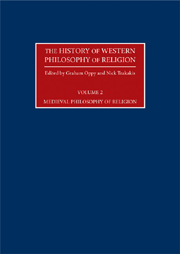Book contents
- Frontmatter
- Contents
- Editorial Introduction
- Contributors
- 1 Medieval Philosophy of Religion: An Introduction
- 2 Boethius
- 3 Johannes Scottus Eriugena
- 4 Al-Farabi
- 5 Avicenna (Ibn Sina)
- 6 Anselm of Canterbury
- 7 Al-Ghazali
- 8 Peter Abelard
- 9 Bernard of Clairvaux
- 10 Averroes (Ibn Rushd)
- 11 Moses Maimonides
- 12 Roger Bacon
- 13 Thomas Aquinas
- 14 John Duns Scotus
- 15 William Ockham
- 16 Gersonides
- 17 John Wyclif
- 18 Nicholas of Cusa
- 19 Erasmus of Rotterdam
- Chronology
- Bibliography
- Index
13 - Thomas Aquinas
- Frontmatter
- Contents
- Editorial Introduction
- Contributors
- 1 Medieval Philosophy of Religion: An Introduction
- 2 Boethius
- 3 Johannes Scottus Eriugena
- 4 Al-Farabi
- 5 Avicenna (Ibn Sina)
- 6 Anselm of Canterbury
- 7 Al-Ghazali
- 8 Peter Abelard
- 9 Bernard of Clairvaux
- 10 Averroes (Ibn Rushd)
- 11 Moses Maimonides
- 12 Roger Bacon
- 13 Thomas Aquinas
- 14 John Duns Scotus
- 15 William Ockham
- 16 Gersonides
- 17 John Wyclif
- 18 Nicholas of Cusa
- 19 Erasmus of Rotterdam
- Chronology
- Bibliography
- Index
Summary
Thomas Aquinas was born in 1224/25 in his family's castle at Roccasecca, Italy. After receiving elementary schooling at the nearby Benedictine abbey of Monte Cassino, in 1239 he began to study liberal arts and philosophy at the newly founded studium generale at Naples. While a student there, he joined the Dominican Order in 1244, much to the chagrin of his family who wanted him to become a Benedictine. At the request of his mother, he was forcibly taken from the Dominicans by soldiers and detained at the family castle for a year or more; but all efforts on the part of his family to persuade him not to become a Dominican failed. In 1245 his family permitted him to rejoin the Dominicans, who promptly sent him to Paris for further studies. There he came into contact with Albert the Great, and after some years in Paris, journeyed to Cologne with Albert, under whom he studied from 1248 until 1252. From 1252 until 1256 he studied theology at the University of Paris and fulfilled the requirements for becoming a magister in theology, including lecturing on the Sentences of Peter Lombard, which resulted in his Commentary on the Sentences. At this time he also published his first two philosophical opuscula: De ente et essentia (On being and essence) and De principiis naturae (On the principles of nature).
- Type
- Chapter
- Information
- The History of Western Philosophy of Religion , pp. 167 - 180Publisher: Acumen PublishingPrint publication year: 2009

